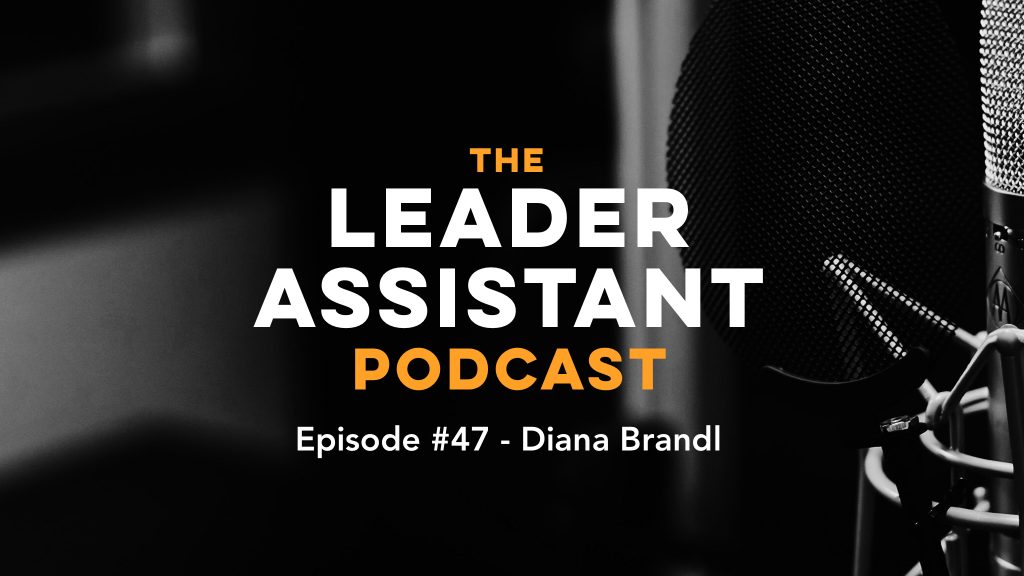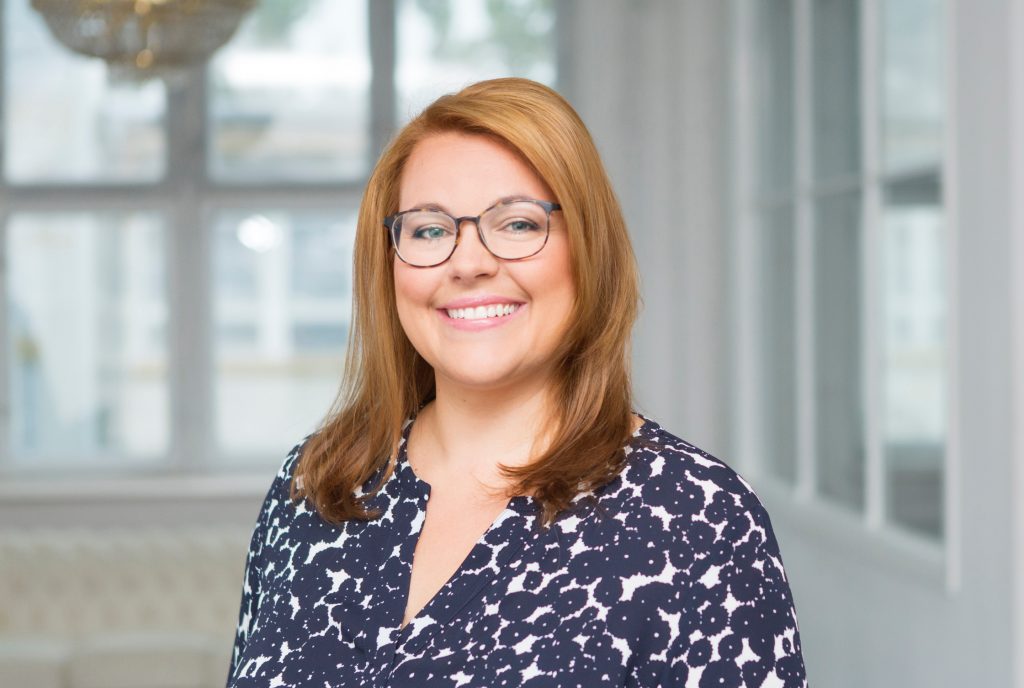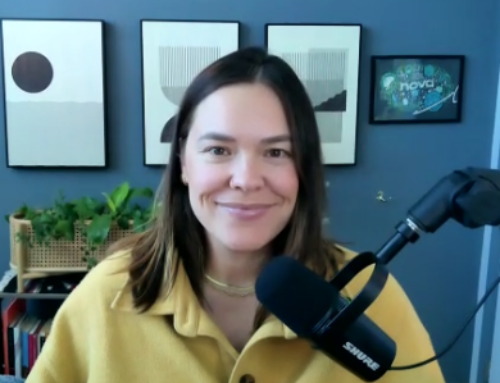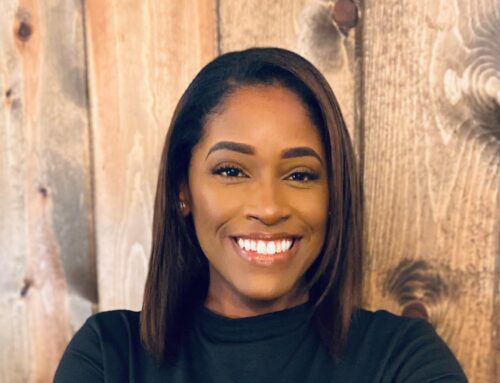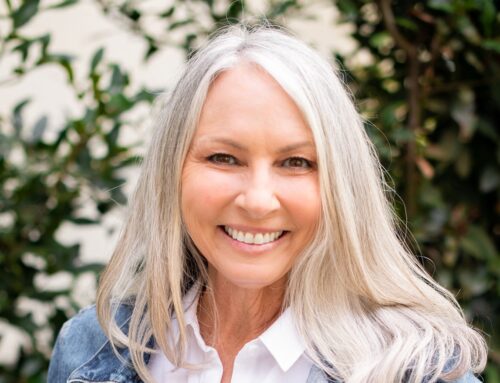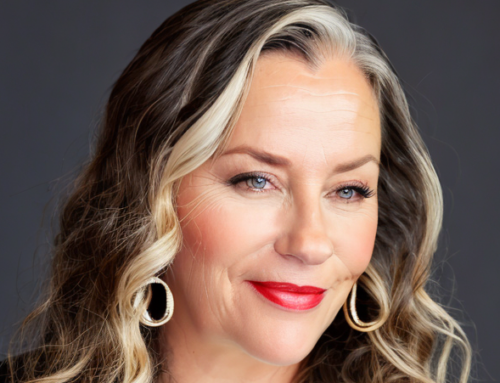I recently met Diana Brandl and she is just as amazing in person as she is on this episode of The Leader Assistant Podcast.
Diana and I talk about artificial intelligence and the future of assistants, what to do if you’ve taken initiative but are not being given a seat at the table, what we can do to help others value our role, and more.
LEADERSHIP QUOTE
Lean in, speak out, have a voice in your organization, and never use the word ‘sorry.’
– Trish Bertuzzi
CONNECT WITH DIANA
ABOUT DIANA
Diana Brandl holds a Degree in International Administration and Management, specializing in Office Management.
Throughout her career, she has worked successfully for C-Level Executives within global corporations such as Sony.
Diana has a strong background in Communications and is a dynamic networker. She joined the professional network IMA (International Management Assistants) in 2006, and is an active member proudly looking back at her involvement as Board Member and Chair of Regional Group of IMA Berlin.
She continuously supports the role of the management assistant by speaking at international events and publishing various articles in Germany and abroad focusing on Digital Transformation, Personal Branding, Strategic Networking, Mentoring, Diversity and Social Media. Diana writes her own blog, The Socialista Projects and is influencing the industry with her creative initiatives such as launching the hashtag #WeAreInThisTogether.
Diana Brandl describes herself as Digital Native and has worked in the start-up world, where she rediscovered her role as a management assistant with 17 years of professional experience within the New Work generation. She teaches first-hand what it means to work with Millennial Managers and how important storytelling is in sharpening a profile.
Diana was selected to represent Germany in the 2018 World Administrators Summit in Frankfurt. She has been working on the future of the Admin industry with Office Professionals from all over the world. As an influencer, Diana will have a strong voice in leading this profession to the future.
Diana is a regular interview partner in Germany and abroad sharing her stories as an expert in Digital Transformation and Personal Branding. Her first book was published in German in 2018. She is currently writing her second book which will be released in 2020.
Diana was recently named as Woman of the Week by the Global Digital Women.
SUBSCRIBE
Subscribe to The Leader Assistant Podcast so you don’t miss new episodes!
You can find the show on Apple Podcasts, Spotify, Google Podcasts, Pandora, and Stitcher.
Join my email list here if you want to get an email when a new episode goes live.
JOIN THE COMMUNITY
Join the Leader Assistant Slack Community here, or the Facebook Group here for bonus content and to network with other assistants who are committed to becoming leaders!
LEAVE A REVIEW
If you’re enjoying the podcast, please take 2 minutes to rate and review the show on Apple Podcasts here. Each review helps me stay motivated to keep the show going!
—
EPISODE TRANSCRIPT
Diana Brandl 0:00
Hi, I’m Diana Brandl today’s leadership quote comes from Trish Bertuzzi. Lean in, speak out, have a voice in your organization, and never use the word sorry.
Podcast Intro 0:13
The Leader Assistant Podcast exists to encourage and challenge assistants to become confident game changing leader assistance.
Unknown Speaker 0:23
Hi, it’s episode 47.
Jeremy Burrows 0:26
Hey friends. Thanks for tuning in to The Leader Assistant Podcast. I’m excited to share today’s episode with you. But first, just wanted to remind you to join our online communities at Facebook.leaderassistant.com and slack.leaderassistant.com. Also, I am publishing a book in 2020 called the leader assistant. So join my email list at leaderassistant.com/signup to make sure you get updates on the book. All right, let’s jump into the episode. Hey, everyone. Thanks so much for tuning in to The Leader Assistant Podcast. I’m your host, Jeremy Burrows and I’m here with my friend Diana Brandl. Diana, how are you?
Diana Brandl 1:07
I’m good. Hi, thank you for having me, Jeremy. Yeah,
Jeremy Burrows 1:09
where are you at in the world right now.
Diana Brandl 1:12
I’m in Berlin, in my home city, I just got back from New York City actually took my mom on a three days trip to New York. So still a bit jet lagged. But back now in Berlin, and we’re looking forward to this podcast.
Jeremy Burrows 1:26
Awesome. So let’s talk a little bit three wind a little bit and talk about your very first job and maybe what skills you learned in that first role that you still use today.
Diana Brandl 1:36
So my really, really first job when I was still actually in high school was being a I was working with small children when they got into school and they learn English. So I was helping to teach them English, I gave them basically extra lessons in English. So they came to my house and sat together with them. And we learned English because my my major studies in school were English and French. So I love languages from the beginning on. And I just wanted to help little kids to get better with English language skills. So this is so funny, because now as since I’m a trainer now, and never thought about that I would all come back. And I would actually now work with other assistance. So it all started a little bit in the fact that I really loved working with people. In that case it was kids, and help them to become better in whatever they are doing at the moment. So in this case, it was English.
Jeremy Burrows 2:40
So when did you become an assistant and why?
Diana Brandl 2:44
Um, I finished high school in 1998. And then I really wanted to go out in the world. So like, basically everyone wants to travel. So I decided to become an au pair and go to the US. And when I was there, I actually knew that I really wanted to work in an office environment. So from the US, I really did my preparations to see what I wanted to become. And in Germany, we really have these classical assistant schools, or at that time Secretary schools, where you get trained as a secretary, it was almost three years. So once I got back from the US, I went to the school, I got my diploma. And I had my first job, being a management assistant to a Hungarian boss, who I also helped to learn German, by the way, that was quite funny. And it was actually a pharmaceutical business. And this was in 2002, I would say yeah, 2002 When my career started.
Jeremy Burrows 3:42
So what do you love about the role of an assistant,
Diana Brandl 3:45
I really enjoy making the impact or having an impact. And of course, every role is a bit different. Every structures are a bit different in organizations. It all depends on the boss, if you have a supportive, supportive boss, and I was lucky enough to always have very supportive bosses, who really gave me a lot of freedom to actually deep dive into the topics I really wanted to jump in. So I was never the one who was just stuck with admin and organizations, that stuff. I really grabbed the opportunities. And I asked for it. I was always quite vocal about it. And this is what I really enjoyed having an impact being there sitting around the table with so many people who want to have an organization grow and who wants to have an impact, who wants to make customers more happy and satisfied. And I always wanted to give this some opportunity also to my role to be part of this impact to be part of the growth, part of strategies and projects. And this is what I really love because as we all know we have so much influence in our roles. We see the emails that are coming in. We see the projects they’re coming in, so it is so easy. Did you say, hey, I want to be involved in that project, I want to talk to my manager about it, maybe I get involved in that maybe I get the resource to help and work on such an important project. And that’s what I did from day one. And that’s what I also tried to really work on in and continue my career, just be ready for any open project that is out there for me.
Jeremy Burrows 5:24
So what would you say to an assistant that, maybe they have tried that? And they’ve tried to say, Hey, can I be involved in that project? Or can I help? And they’ve kind of stepped up and tried to take on more, but have been met with resistance from their executives, like, oh, no, that’s, you know, stay in your lane. And that’s not what you know, what would How would you encourage assistance in that situation?
Diana Brandl 5:46
Yeah, I know, it’s always hard in the beginning. And because, of course, we all know that the moment you’re jumping on a project, they’re still the other daily business you need to, to handle. And it’s quite a challenge sometimes. So whenever I was ready for such a project, I really had a little mini white paper ready from my boss, to really show Hey, these are the strengths, I would love to bring it to the projects, I think I’m ready for this. And I’ve thought about the other things that are on my table, I have a few solutions, we can work on that. I can delegate a few things here, I can help get some other things done in this way. So be prepared for early solutions, because of course, your manager will ask for you. Okay, sounds good. Like you want to jump in this project. But who’s going to do my travel expenses, who’s going to do that, because the moment when the managers really see that you you want to fly away a little bit, they get scared as well, because they get scared, scared that their stuff will not be done properly. So have a plan already. And always show the strength you want to prepare, bring to the to the table and you want to bring in the center project, and have everything else covered, talk to your co workers to talk to your assistant colleagues, how you can manage to be ready for such a project, because it’s going to take time, it’s going to mean that you have to walk an extra mile, it’s going to mean some extra hours. So of course, this is also that comes with such a freedom of being ready for such projects.
Jeremy Burrows 7:17
It’s great. So what was the biggest mistake you made as an assistant? And what did you learn from it?
Diana Brandl 7:27
I think the fact that I was especially in my junior years, when I was not confident enough to speak up, I really accepted a lot of situations what I probably wouldn’t accept nowadays, I had a lot of generation conflicts with other assistants, because I was the one young dynamic coming in, you know, bringing new lot knowledge into the organizations, speaking a few languages coming from abroad being in the US as an au pair, bringing a totally new view on the industry. So I had a lot of fights with senior assistants, who were afraid of the dynamic with comes into the role who were afraid of the change that might come. And the first years I really didn’t speak up, and I just let it happen. And I tried to change myself, which was wrong, obviously. So I tried to adapt more to them, instead of allowing them to adapt more to my style as well. And I think this is something I would definitely encourage others to to really face such a situation and to speak up. Involve the managers, I was always I always had the view of not involving my manager because I wanted to handle everything myself, I didn’t want to get him or her involved with all these like tiny things, tiny issues. But I knew after a while that a few things you just need to address to your manager and speak up and be be ready also for confrontation. Because nobody likes this. Everyone likes to be in harmony when it comes to work. Everyone likes to work together in a very positive way in a friendly way. But sometimes they are these kinds of critical situations. And I would definitely speak up now, much, much earlier and also involve HR people if I have the feeling that I’m mob or really bullied in a way that it shouldn’t happen actually in an environment, especially when you work on a C level basis.
Jeremy Burrows 9:34
So what’s something we could do to help executives and HR departments and recruiters and others and organizations value assistance?
Diana Brandl 9:43
Well, I think it’s always the storytelling that sometimes needs to be a little more stronger. Of course we all encourage through our seminars and workshops and a lot of material to read. We encourage assistants to become more bold and become more louder and really Be ready for some personal branding. And this needs to start with their own managers. And with HR people, sometimes when I come to companies where I teach, I always ask them about the job descriptions, and so many of them, they don’t have one. So if there’s no dop, job description plays, how can HR people actually know what the assistant is doing and how visible the assistant needs to be. So that’s why we all should have a job description ready. And we should really campaign for such a job description and really go through every single detail because the assistant is the one who can basically know exactly what’s what should be on the job description or a note in a job person should be ready to write a job description, because it usually doesn’t fit well. So the moment you have a job description, if you don’t have one, start writing it and go to your manager, go to HR and walk them through your job description. Walk them through the steps, tell them why you’re proud of your role. Tell them the impact you have, and why you are such an important influencer as a strategic business partner. And not only as the admin or the clerk around the corner, because there’s so much more, that’s a way to you. And I always love to work with mindmaps. So I always encouraged assistants in my seminars to actually write their job description as a mindmap. Because visual visualization is always interesting. People will be more attentive, and you have a chance to do some public speaking in front of your manager in HR, the moment you’re stepping up, and you say, Hey, let me walk you through this mind map. And this is me, that’s my profile. And that’s the portfolio I’m bringing in. So are you aware of that job description, actually, is that the deal we actually took a few years ago when we started working together. And so you can really, really show what happened, maybe to your role, how much you grew, and really show them the value what’s behind this important position.
Jeremy Burrows 12:02
That’s great. So what’s maybe something you would tell someone who’s considering becoming an assistant,
Diana Brandl 12:12
I would definitely say it’s a perfect timing to do that because of technology and digitization around the corner, affecting this industry, it is the right momentum to step into this into this profession. Because you can bring in so many talents, you can bring in those talents are needed, especially when we are facing the digitization, a lot of soft skills, a lot of skills where you show the human factor, where you show that you are very important as a leader in your role as well, because we are leaders as assistants, as we make so many decisions on our own. And we are the ones who really influenced our managers in certain ways, how they can really make or perform their job in a better way. So I actually had the other day, I had a message over LinkedIn from a young German boy, he was quite young. And I was really, really fascinated because he’s really interested in becoming an assistant he wants to get become a trained assistant. So I’m having a call with him after I returned from my vacation. So it will be interesting to give you some feedback on that Jeremy as well. Because I found it so fascinating that it’s it’s also a man and that he’s ready for this industry. So I would definitely say get prepared. Be ready for this profession. Be a techie, be ready for technology, know what’s happening out there. Be a trendsetter, be a trend Scout, be international, have your language skills ready. And all the other skills that are bases which are needed for this role, being an organizational expert, being an office hero and of course know Know your worth and know your know your voice and also be ready to be called an important player in this organization.
Jeremy Burrows 14:10
That’s awesome. So on the technology realm, what are your thoughts on artificial intelligence and what assistants should do to prepare for the future of work?
Diana Brandl 14:21
Well, I love it. I love it really and I wouldn’t know what I would do with my Siri. I mean I work with Siri all the time as a solopreneur is such a important and effective high level helper for me. And not only Siri there are so many other great products out there, the digital assistant on one hand and of course all the other robotics that are coming more and more into the organizations as a lot of expert of the industry say and I one of them as a truly, really want to jump in and say of course they will help us to shape the new way of working as an assistant They will help us to free up our time, they will help us to get ready for so many other important projects where we can show our leadership style where we can show the value we have the work we have, and all the other important elements were bringing to the table. So whenever there’s opportunity work with a great software with a digital assistant, that frees up your time that frees up the time of your co workers. Like when Alexa is ready to book meeting rooms, when Alexa is ready to do travels, of course, we are lucky to delegate this finally, we are in a position to delegate work. Because of the technology and AI coming into our workplace. And this is awesome. This is really awesome. And of course, a lot of people are afraid of it, especially here in Europe, we have the GDPR, which is quite strict. So you wouldn’t see too many Alexa’s in offices here. But I’ve met a few assistants who actually worked with them, and their bosses are younger, they are very innovative, they are ready to tackle the challenges of the future. And they they really want to work with these devices. And they want their assistants to work with these devices. Because the millennial managers, they want their assistance in different projects. They want them to take the lead, they want them as people who come back with feedback with recommendations how to improve processes in an organization. And this is why we need a free agenda for ourselves to really work strategically in an operational way as well. Because otherwise we’re stuck with all the other admin and organizational tasks, which we love, of course, is that’s why we are assistants but they keep us busy. They keep us busy, we are constantly interrupted by things when we’re working with co workers and various managers. And so he is AI giving us the freedom to finally show what else is waiting in the profile of an assistant. And it’s time to show the portfolio and to really upskill here there and yeah, bring the value to the table. And that’s thankfully, available now because of AI and technology.
Jeremy Burrows 17:20
Love it kind of put it better myself.
Diana Brandl 17:24
I know you’re a great supporter, too. And Jain AI is a great product. I’ve been introducing it a lot in my seminars. And that’s that’s the future that definitely that’s the future.
Jeremy Burrows 17:36
So let’s get back to your story a little bit. What what companies did you work for in your whole EA career and how long were you EAA?
Diana Brandl 17:44
Well, I started as I said in 2002. And I yeah, basically started my my nine my new life as a trainer and speaker almost two years ago. Until then I was a full time executive assistant. And my career started in the pharmaceutical business. And then I moved to a big global player Sony, when I moved to Berlin, I was also working as at a midsize company where I had a lot of great opportunities to have an impact in the organization because it was also leading the internal communications department at that time, I was writing speeches for the executive. So it’s not always about the big companies with a big name. Sometimes you have wonderful opportunities working in smaller companies, because all of a sudden you have definitely more freedom to explore new skills, and to dive into new projects are really greatly appreciated and really enjoyed myself. And before I started my my own business, I had the opportunity to work in a startup business. It is an online optician very famous brand in Europe. So they are selling glasses and sunglasses online. It was called Mr. Specs. Great, great company, I really enjoyed working with them. And because they prepared me for the new way of working. And they prepared me for the new way of the executive out there. All of a sudden, they were younger, all of a sudden, they had different expectations. In terms of working with an assistant, all of a sudden I was a supervisor, I had three office managers working for me reporting to me. And so I really understood the way they they want me to lead and it was absolutely a lot of work. A lot of new learning, but I feel very blessed that I had the opportunity to really finish. Yeah, how should I say it my career before starting as an intrapreneur working with these guys because they really showed me the new way of working and how important digitization is, how important digital leadership is and how important Yeah, you industry 4.0 is
Jeremy Burrows 20:02
so why did you decide to leave and start your own business?
Diana Brandl 20:07
It was never a long term plan. It’s never did I have a direction somewhere that I thought okay, by the year 2017, Diana will be ready to be on her own. It’s just started all of a sudden, I’ve always loved writing contributed a lot of articles to various magazines in Germany and abroad. And yeah, one time I’ve been asked to to actually speak at a conference, which was in Berlin at that time to fill in one of the speakers were sick. So I was asked if I would be there to ready would be ready to speak there. It was about networking, I remember that. Like, they know you’re a great networker. You’re active on social media. So it’s your topic, what, right? And at that time, it wasn’t English. And I was I was really not prepared for it. But I said, Yes. And I felt I should do this and just raise my hand and grab the opportunity. And this is how it all started. I gave my first speech. And then I went back to my full time position at Mr. Spex. Didn’t have any plans on working on my own. But the feedbacks were great. I’ve been approached more and more, I had to decline a few things because I was a full time EA, and then after another decline decline, I said to my husband, okay, why not trying that out? Actually, why not have what should I lose? I try it out. If it’s not working, I go back at my full time VA position, I love to do all the way. I mean, I’ve been doing that for so many years. It’s not that I have no regrets, no regrets of going back. And of course, it was a family decision. And he said, Of course you do that. And I know, you love to work with people, you love to share your knowledge, you’re a good ambassador. So he was the one encouraging me to do that massively. And I’m forever grateful for that. And forever grateful for these clients who, who brought me on stage and in those early, early moments. And so that’s how it all started. And all of those that I was not only writing, I was speaking about the topics, which are so close to my heart.
Jeremy Burrows 22:23
That’s awesome. So since you’re the expert at networking, how important is it to be part of a community of assistance.
Diana Brandl 22:31
It is super important. I always say, hey, there’s so much information out there. And it’s all for free. And by the way, we network with our peers, we get to know each other we as an assistant in Germany, I’ve always been interested what assistants in the US are doing what assistants in France are doing or in the UK, I wanted to see the differences, I wanted to see the things that we have in common. And this is what I always like to transport in my talks that it’s so valuable when you sign up for for these groups. When you sign up for forums, blogs, where you have the opportunity to network and to share knowledge, that’s the best you can can do. And once you have a great network, I always say you don’t need Google anymore, you know who to call, you know who to reach out. When you need to make a table reservation at the best Steakhouse in Boston, you shortly I’m sure you know the assistant who you kind of reach out to because she might have a good connection to this place and is even able to organize your wonderful table for your manager. And that’s the way we all should help each other. And that’s why I also came up with the initiative we are in this together because I strongly believe that in our industry in our community, we should step up for each other, help each other, be there for each other and applause for each other and be proud of each other and put the positivity more in front of our work. And that’s that’s really important. And it’s the way you network. And it’s the way you build bridges, because the network you are generating is helping your organization is helping your manager. And that’s also something I learned from my millennial managers back at the startup. I mentioned before, in the interview process, they were the one asking me about the network I’m bringing in. So that’s the way they think and that’s why they supported my networking activities so much. I remember when I got my contract they had a side letter from me, granting me the membership of the European Management Assistance organization ima they said Diana, we love that you are active there. We love that you promote your profession. We see that you’ve been a member for many years. So it is important for you and the network you are generating there and the contacts. They might be also useful for us so we are happy to take over the fees for the organization for this for a year. We’re going to send you on track innings, we’re gonna send you out. And we’re going to cover the costs, because that’s how we keep you motivated. And I really, really enjoyed that.
Jeremy Burrows 25:08
Wow, that’s an amazing, amazing support from an organization, that’s for sure.
Diana Brandl 25:13
Absolutely. I’ve never had that before. I mean, I’ve been supported before a lot, but I had to fight for it. But this was the only organization who came actively and said, Hey, look, here, we saw that on your profile. We know that you’ve been involved. You’ve been a Regional Chair, you do a lot for this profession. And we want to, yeah, we want to be part of that. And we want you to bring the knowledge you’re gaining from these conferences. We want them to bring back you have three office managers reporting to you. So make them ready for their next step as well.
Jeremy Burrows 25:51
So what’s one book or resource that you would recommend to all assistants?
Diana Brandl 25:59
Well, there are too many out there, there are too many out there. Of course, finding the groups on social media, absolutely. Amazing. It is quite hard to name all of them. I still love to read a lot of books, love to have a book in my hand. Although I’m a digital girl. And in terms of networking, one of the books I really love and which helped me a lot was the one from Laura Schwartz, “Eat, Drink and Succeed.” Beth Schwartz, the former director events from the Clinton Administration at the White House, I had the honor of meeting her a few times. And she’s absolutely absolutely networking hero for me. And I learned a lot of things from her. I’ve attended networking events together with her, I saw her house, she’s networking. I saw her house, she introduced me to people. And I really picked up a lot of great initiatives from her. So this is a book I definitely would recommend. I also enjoyed the book for Peggy grande a you recently also interviewed her for the podcast Sirius, when she started, basically spoke about her experience working for former President Reagan incredible book I read a few few years ago. So this is something I really adore, reading stuff from people who’ve been in the industry, who’ve been doing our jobs, because they have been there. They have been there on the basis. They know the work behind and they know how tough it can be. And so I’d love to hear from these people. Also former assistant of Nelson Mandela, Zelda, Lundgren J. incredible woman, we’re gonna see her in November, in Atlanta. And so this is something I would definitely would recommend for assistant out there. And of course, the all these groups on social media, there are a bunch of them. Executive Secretary magazine is a great one. I absolutely adore Lucy brasier. And her work. She’s the one who believed in me from day one putting me on stage. And very excited to see you speaking next year in London. By the way, Jeremy, congratulations.
Jeremy Burrows 28:15
Yeah, thank you. I’m excited. I’ve never been to London. So it’ll be fun. Absolutely. So if you could snap your fingers and instantly give all assistance more of something, what would it be
Diana Brandl 28:28
a louder voice, a louder voice. And sometimes they have the voice, but they just forget about it. Because they’re always in their hamster wheels. They’re so busy performing the job and being good at their jobs and being ready for their managers being always there for the co workers and preparing the stage for them. But sometimes they forget to actually prepare the stage for themselves because we need a stage as well. And we have a stage, which is need to make this first or take this first step on stage. And sometimes it’s hard. Because all these years we’ve been trained to be in the background all these years, we have been trained to serve from the second or the third row. But now with digitization, with ai, ai coming. And the whole digital workplace, everything is changing. The new managers are ready for us they are ready for vocal and bold assistance. They want really true business partners next to them. So that’s why sometimes this voice who’s which has been in us all the time, needs to get a little louder. So don’t sit in a meeting, just writing the minutes have a voice. Give your opinion, share experiences, share your knowledge. And even if there will be always some managers and executives staring at you. So why is she saying that? Or why is he saying that she should be writing the minutes. He shouldn’t be writing the minutes now start being more proactive in this field. And it is really, really crucial that we really discover our voice and and public speaking becomes one of the most important skills in the future for assistance. So don’t be just there being the minute writer, be the host, be the facilitator, speak up and offer your executive as well. Like, Hey, can I be the host today? Can I go through the agenda? Can Can I take this task away from you, maybe. And he Here you go, again, another opportunity to free up a little bit of the time of your manager, because what’s the greatest gift we can give our managers it’s time. So that’s why we are there. And that’s why we should really focus on these elements where we can actually help them in a more strategic and operational manner.
Jeremy Burrows 30:45
That’s great, Diane, I really appreciate you sharing your wisdom and taking time out of your day to be on the show. I wanted to wrap things up, and why don’t you tell us how we can support you and where we can find you online.
Diana Brandl 31:01
Thank you so much, Jeremy. Appreciate the time you took to to have me on the podcast. And yeah, well, you find me on social media. As a digital girl, you you find me on Twitter, you’ll find me on LinkedIn, would love to invite you to join my blog, thesociallysubprojects socially says some people ask me, so where’s the name coming from? And I always say I’m a very social person. Good connector, socialista building bridges, bringing people together. That’s that’s really one of my main duties out there. And I just love that. So the socialist project is my blog, I would love to have you there. We have readers around the world assistant from all around the world. And if you would like to be involved in the we are in this together initiative, of course, I would love to, to have you reach out to me because I love to have supporters. I love to have people who like to share their stories, or have maybe a inspiring quote, where they would love to be involved, that actually shows that you are a great supporter of the admin industry, that you are a supporter of the community, and maybe you have a story to share with us. I would love to hear from you.
Jeremy Burrows 32:14
Awesome. Well, I’ll definitely share all that information in the show notes and so people can find you. To wrap things up. I would love to have you use a little bit of German for our listeners. maybe say something like thanks for listening to The Leader Assistant Podcast in German.
Diana Brandl 32:33
Of course, I would love to do that. Feeling even dank this year The Leader Assistant Podcast tapped.
Jeremy Burrows 32:41
I’m sure you can. I’m sure you can say it in probably five other languages too. Right?
Diana Brandl 32:45
Well, I can. Yeah, maybe. Well, that not that fluent. But I used to learn a lot of languages. But of course we all talk English. It makes it so much easier. But I used to learn also Latin and Spanish and French in school. So my parents forced me into the languages but I’m quite happy about it because it helps me when I travel. Yeah.
Jeremy Burrows 33:09
Awesome. Well, thanks again and we’ll talk soon and appreciate you being on the show.
Diana Brandl 33:14
Thank you so much, Jeremy and continue you’re absolutely amazing work.
Jeremy Burrows 33:18
Thank you Diana for being on the show. It was great conversation. Check out the show notes at leaderassistant.com/47 And I look forward to talking with you next week.
Unknown Speaker 33:42
You on Apple podcasts. Goburrows.com

